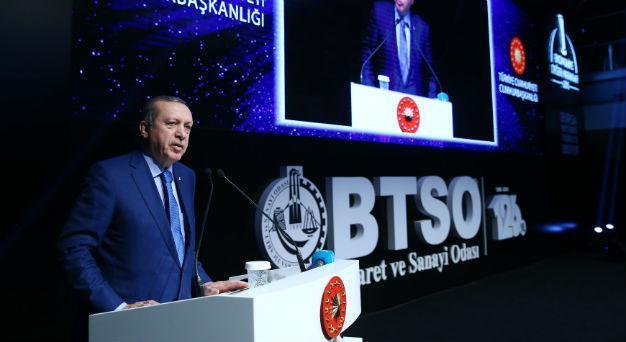Erdoğan refers to Iraq’s reaction as ‘hypocrisy’
BURSA

AA photo
Iraq’s recent reaction regarding the additional deployment of Turkish troops in the country’s north is an example of “hypocrisy,” Turkish President Recep Tayyip Erdoğan has said.“None of the separatist terror organization’s [the outlawed Kurdistan Workers’ Party - PKK] actions in the country, the obstacles that have been brought before us in Syria or the hypocrisy we are being subjected to in Iraq are a surprise or dissuasive for us,” Erdoğan said late Dec. 21 during an award ceremony in the northwestern province of Bursa.
Erdoğan was referring to the relationship between Turkey and Iraq, which has been tense since Dec. 4, when Turkey deployed additional troops, hundreds of commandos and a small mechanized unit to the Bashiqa camp near Mosul. The move infuriated Iraq to the extent that it brought the issue before the United Nations Security Council, asking it to use it powers to force Turkey to pull its troops from Iraq.
US urges bilateral solution
Meanwhile, U.S. State Department spokesman John Kirby said they hoped the crisis between Turkey and Iraq would be solved bilaterally.
“Our view is we want this worked out bilaterally between the two countries [Turkey and Iraq]. We’re encouraged by the dialogue that they’ve had and the progress they seem to have made,” said Kirby during a daily press briefing on Dec. 21.
Kirby reiterated the U.S.’ position that any kind of military activity inside Iraq needed to be done with the approval of the sovereign Iraqi government.
Turkey withdrew a portion of its troops from the Bashiqa camp early last week but this effort failed to calm Iraq’s anger over the issue.
Turkey announced Dec. 19 that it would continue to remove its troops from Bashiqa upon insistent appeals from Washington, which included a phone call from U.S. President Barack Obama to Erdoğan one day before.
“Turkey, in recognition of Iraqi concerns and in accordance with the requirements of the fight against Daesh, is continuing to move military forces from Nineveh province, which were the source of the miscommunication,” a Foreign Ministry statement read late Dec. 19. Daesh is the Arabic acronym for the Islamic State of Iraq and the Levant (ISIL).
Turkey’s announcement of a withdrawal came just a day after Obama’s call to Erdoğan and two days after Prime Minister Ahmet Davutoğlu denied reports that U.S. Vice President Joe Biden requested him to pull back troops from Mosul.
Baghdad on Dec. 20 welcomed Turkey’s move to pull the troops but said it would keep up efforts at the U.N. to achieve a full withdrawal.
“What has been reported in the media is a step in the right direction,” Foreign Minister Ibrahim al-Jaafari was quoted as saying in a statement from his office. “We will carry on our process with the Security Council until a full withdrawal is achieved.”
Turkish troops to continue to train troops in Bashiqa, says deputy PM
Meanwhile, Turkish Deputy Prime Minister Numan Kurtulmuş said Dec. 21 that Turkish servicemen would continue to conduct training at the Bashiqa camp.
“The training [conducted] there by Turkish troops will continue [...] The additional troops we sent there [earlier this month] have been pulled back to rear positions,” state-run Anadolu Agency reported Kurtulmuş as saying after a cabinet meeting in Ankara on Dec. 21.
“Turkey’s main goal in sending additional troops to [the Bashiqa camp] was to increase our sensitivity in the fight against Daesh and to better protect our soldiers there,” Kurtulmuş said.
“Now some of these additional troops were withdrawn from [Bashiqa], but I would like to express that we are on alert not to jeopardize our presence there and elsewhere,” he added.
















